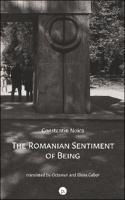The Romanian Sentiment of Being
Author(s)
Noica, Constantin
Contributor(s)
Gabor, Octavian (other)
Gabor, Elena (other)
Collection
ScholarLedLanguage
English; RomanianAbstract
The link between language and thought formed a major new exploration of twentieth-century philosophy. Languages nuance our ideas and perceptions. Though from various angles, Heidegger, Derrida, Wittgenstein forged new ways of understanding the relationship between our views of the external world and our culturally and linguistically pre-determined modes of expression.
Another giant in this field of exploration is the Romanian philosopher Constantin Noica (1909–1987), who has so far remained generally unknown to the Western World because of the Iron Curtain. The Romanian Sentiment of Being (Sentimentul românesc al ființei), first published in Romanian in 1978, is a philosophical work at the intersection of metaphysics and philosophy of language. The title of this book may be deceptive. “Romanian” does not mean ethnically circumscribed; it does not limit ontology to nationality but rather reflects on how language can carry ontological thought.
The Romanian Sentiment of Being invites the readers to meditate on the fundamental theme of being and how it is expressed in a culture in time. This being in time marks the tension between moment and eternity, captured in the fairytale ""Ageless Youth and Deathless Life"" (""Tinerețe fără batrânețe și viață fără de moarte""), which Noica interprets in detail. The translation of the story will be found in the appendix. Noica also analyzes one of the most famous poems in Romanian, Mihai Eminescu’s ""The Evening Star"" (""Luceafărul""), and readers will find its translation in the appendix.
Keywords
metaphysics;Mihai Eminescu;philosophy of language;Romance languages;Romanian StudiesDOI
10.53288/0355.1.00ISBN
9781685710385, 9781685710392Publisher
punctum booksPublisher website
https://punctumbooks.com/Publication date and place
Brooklyn, NY, 2022Classification
Romania
Philosophy of language
Philosophy: metaphysics and ontology


 Download
Download Web Shop
Web Shop